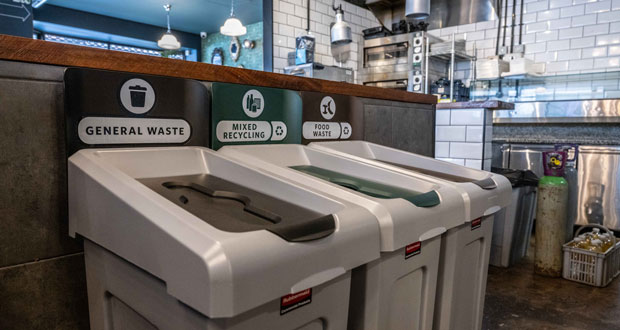Almost a quarter of SMEs are unaware of major recycling legislation changes with 81 per cent expressing concerns as the deadline approaches, according to a new survey conducted by international waste and recycling manufacturer Rubbermaid Commercial Products (RCP) through Censuswide.
From 31 March, new ‘Simpler Recycling’ legislation, being brought in under the Environment Act 2021, will require all businesses in England with 10 or more employees to separate dry mixed recyclables and food waste from their general waste, prior to collection from their premises. The survey of 300 SMEs showed that just 61 per cent of them across various sectors – hospitality, education, healthcare, manufacturing and utilities, retail, and travel and transport- are currently separating any waste for recycling, meaning many have substantial changes to make ahead of the March deadline.
The new rules requiring food waste to be separated for recycling will affect the vast majority of SMEs with 83 per cent reporting that they generate food waste on their premises, but over three quarters not currently separating that waste for recycling. The food waste recycling mandate will mean that hospitality is set to be one of the sectors most impacted by the legislation, yet of the industries surveyed it reported the lowest level of awareness at just 62 per cent compared with a 78 per cent average.
While 81 per cent of respondents classed improving recycling at their facility as important, the same number said they are concerned about the impact of new legislation on their business, with travel and transport (96 per cent) and education facilities (88 per cent) expressing the most concern.
Across the sectors, the top concern cited was the resource needed to implement the required changes (43 per cent), with reputation second (42 per cent), followed by lack of knowledge (39 per cent), cost and timescale to make changes (both 36 per cent).
Responding to the findings, RCP’s Sustainability and Communications Manager, Adriana Olaya Rodriguez commented: “Of the SMEs we surveyed, less than two thirds are currently separating their waste for recycling, which means many are going to need to make significant changes to prepare for the new recycling legislation over the next few months, especially those that generate food waste on their premises.
“With the majority saying improving recycling is important to their business and the new rules on the horizon, it’s clear the appetite and need for change is there. With the limited resources and budgets available to SMEs, it’s not surprising to hear that many of these businesses have concerns about the changes they need to make and how they’ll impact their businesses.
“What I would say, however, is that introducing efficient multi-stream recycling throughout a facility actually reduces waste management costs so the initial investment and use of resources pays off in the long-term. And with more efficient systems that are easier to use – in terms of the disposal, emptying and movement of waste – you can see increased efficiency and productivity too.
“There are also plenty of free resources available online as recycling organisations, waste contractors and manufacturers like RCP are supporting businesses with the education and advice they need to get ready before March, so there is support available for those concerned about a lack of knowledge.”
RCP has created a series of free resources to help businesses get ready for the changes.





